Sebald / Shelburne
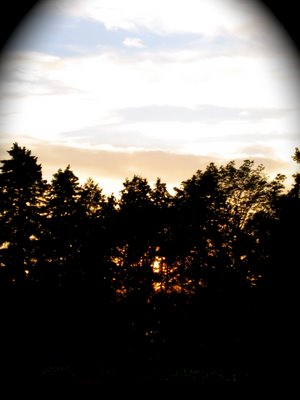
As i sat there that evening in Southwold overlooking the German ocean, i sensed quite clearly the earth's slow turning into the dark.... .... The shadow of night is drawn like a black veil across the earth, and since almost all creatures, from one meridian to the next, lie down after the sun has set, so, he continues, one might in following the setting sun, see on our globe, nothing but prone bodies, row upon row, as if levelled by the scythe of Saturn - an endless graveyard for a humanity struck by falling sickness.
 I stood before the grave for some time, not knowing what i should think; but
I stood before the grave for some time, not knowing what i should think; butbefore i left i placed a stone on the grave according to custom.
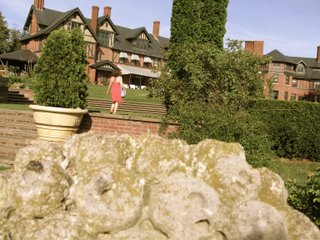 Though there is little else that she can call her own, she always wears the most outrageous bonnets on these walks; one which features a seagull's wing, i remember particularly well because Herr Bein the teacher referred to it in school, telling us we should never kill any creature merely in order to adorn ourselves with its feathers.
Though there is little else that she can call her own, she always wears the most outrageous bonnets on these walks; one which features a seagull's wing, i remember particularly well because Herr Bein the teacher referred to it in school, telling us we should never kill any creature merely in order to adorn ourselves with its feathers.
The winter sun shows how soon the light fades from the ash, how soon night enfolds us. Hour upon hour is added to the sum. Time itself grows old. Pyramids, arches, and obelisks are melting pillars of snow. Not even those who have found a place amidst the heavenly constellations have perpetuated their names: Nimrod is lost in Orion, and Osirus in the Dog Star. Indeed, old families last not three oaks. To set one's name to a work gives no one a title to be remembered, for who knows how many of the best of men have gone without a trace?

Once father is home, the candle made of many interwoven strands of wax is lit to mark the end of the sabbath. We smell the little spice-box and go upstairs to
bed. Soon dazzling white lightning is flashing across teh sky, and the crashes of thunder set the whole house shaking. We stand at the window. There are moments when it is brighter than daylight outside. Clumps of hay are afloat on the swirling waters in the gutters. Then the storm passes over, bu presenty returns once more. Papa says it cannot make it over Windheim woods.
bed. Soon dazzling white lightning is flashing across teh sky, and the crashes of thunder set the whole house shaking. We stand at the window. There are moments when it is brighter than daylight outside. Clumps of hay are afloat on the swirling waters in the gutters. Then the storm passes over, bu presenty returns once more. Papa says it cannot make it over Windheim woods.
 The Last entry in my great-uncle adelwarth's litle agenda book was written on the feast of stephen. Cosmo, it reads, had had a bad fever after their return to jerusalem but was already on the way to recovery again. My great uncle also noted that tlate the previous afternoon it had begun to snow and that, looking out of the hotel window at the city, it had begun to snow and that, looking out the hotel window at the city, white in the falling dusk, it made him him think of times long gone. Memory, he added in a postscript, often strikes me as a kind of dumbness. It makes one's head heavy and giddy, as if one were not looking back the receding perspectives of time but ratherdown on the earth from a great height, from one of those towers whose tops are lost to view in the clouds."
The Last entry in my great-uncle adelwarth's litle agenda book was written on the feast of stephen. Cosmo, it reads, had had a bad fever after their return to jerusalem but was already on the way to recovery again. My great uncle also noted that tlate the previous afternoon it had begun to snow and that, looking out of the hotel window at the city, it had begun to snow and that, looking out the hotel window at the city, white in the falling dusk, it made him him think of times long gone. Memory, he added in a postscript, often strikes me as a kind of dumbness. It makes one's head heavy and giddy, as if one were not looking back the receding perspectives of time but ratherdown on the earth from a great height, from one of those towers whose tops are lost to view in the clouds." As i pictured him, he had taken off his spectacles and put them on the ballast stones by his side. The gleaming bands of steel, the crossbars of the sleepers, the spruce trees on the hillside above the village of Altstadten, the arc of the mountains he knew so well, were a blur before his short-sighted eyes, smudged out in the gather dusk. At the last, as the thunderous sound approached, all he saw was a darkening greyness and in the midst of it, needle-sharp, the snow-white silhouettes of three mountains.
As i pictured him, he had taken off his spectacles and put them on the ballast stones by his side. The gleaming bands of steel, the crossbars of the sleepers, the spruce trees on the hillside above the village of Altstadten, the arc of the mountains he knew so well, were a blur before his short-sighted eyes, smudged out in the gather dusk. At the last, as the thunderous sound approached, all he saw was a darkening greyness and in the midst of it, needle-sharp, the snow-white silhouettes of three mountains.

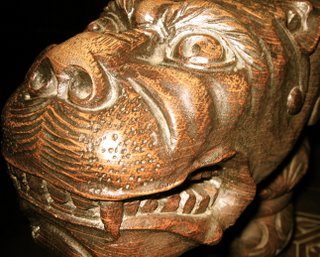 I now sometimes feel that at that moment i beheld an image of death - lasted only a short time, and passed over me like the shadow of a bird in flight.
I now sometimes feel that at that moment i beheld an image of death - lasted only a short time, and passed over me like the shadow of a bird in flight.

I saw with a shudder that went to the roots of my hair, a beetle rowing across the surface of the water, from one dark shore to the other.
 In august 1992 when the dog days were drawing to an end, i set off to walk the county of suffolk, in the hope of dispelling the emptiness that takes hold of me whenever i have completed a long stint of work. And in fact my hope was realized, up to a point; for i have seldom felt so carefree as i did then, walking for hours in the day through the thinly populated countryside, which stretches inland from the coast. I wonder now, however, whether there might be something in the old superstition that certain ailments of the spirit and of the body are particularly likely to beset us under the sign of the dog star.
In august 1992 when the dog days were drawing to an end, i set off to walk the county of suffolk, in the hope of dispelling the emptiness that takes hold of me whenever i have completed a long stint of work. And in fact my hope was realized, up to a point; for i have seldom felt so carefree as i did then, walking for hours in the day through the thinly populated countryside, which stretches inland from the coast. I wonder now, however, whether there might be something in the old superstition that certain ailments of the spirit and of the body are particularly likely to beset us under the sign of the dog star.
 "For the history of every individual, of every social order, indeed of the whole world, does not describe an ever-widening, more and more wonderful arc, but rather follows a course which, once the meridian is reached, leads without fail down into the dark."
"For the history of every individual, of every social order, indeed of the whole world, does not describe an ever-widening, more and more wonderful arc, but rather follows a course which, once the meridian is reached, leads without fail down into the dark." A shock of recognition shot through me at the grave of Maier Stern, who died on the 18th of may, my own birthday; and i was touched, in a way i knew i could never quite fathom, by the symbol of the writer's quill on the stone of frederike halbleib, who departed this life on the 28th of March 1912. I imagined her pen in hand, all by herself, bent with bated breath over her work; and now,
A shock of recognition shot through me at the grave of Maier Stern, who died on the 18th of may, my own birthday; and i was touched, in a way i knew i could never quite fathom, by the symbol of the writer's quill on the stone of frederike halbleib, who departed this life on the 28th of March 1912. I imagined her pen in hand, all by herself, bent with bated breath over her work; and now,as i write these lines, it feels as if i had lost her, and as if I could not get over the loss despite the many years that have passed since her departure.
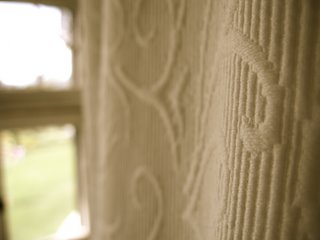 ... And so they are ever returning to us, the dead. At times they come back from the ice more than seven decades later and are found at the edgeof the Moraine, a few polished bones and a pair of hobnailed boots.
... And so they are ever returning to us, the dead. At times they come back from the ice more than seven decades later and are found at the edgeof the Moraine, a few polished bones and a pair of hobnailed boots.
Who the young women are in the picture i do not know. The Light falls on them from the window in the background, so i cannot make out their eyes clearly, but i sense that all three of them are looking across at me, since i am standing on the very spot where Genewein the accountant stood with his camera. The young woman in the middle is blode and has the air of a bride about her. The weaver to her left has inclined her head a little to one side, whilst the woman on the right is looking at me with so steady and relentless a gaze that i cannot meet it for long. I wonder what the tree women's names were - Roza, Luisa and Lea - or Nona Decuma and Morta, the daughters of night, with spindle, scissors and thread.
 And Sir Thomas Browne, who was the son of a silk merchant and may well have had an eye for these things, remarks in a passage of the "pseudodoxia Epidemica" that i can no longer find that in the Holland of his time it was customary, in a home where there had been a death, to drape black mourning ribbons over all the mirrors and all canvasses depicting landscapes or people or the fruits of the field, so that the soul, as it left the body, would not be distracted on its final journey, either by a reflection of itself or by a last glimpse of the land
And Sir Thomas Browne, who was the son of a silk merchant and may well have had an eye for these things, remarks in a passage of the "pseudodoxia Epidemica" that i can no longer find that in the Holland of his time it was customary, in a home where there had been a death, to drape black mourning ribbons over all the mirrors and all canvasses depicting landscapes or people or the fruits of the field, so that the soul, as it left the body, would not be distracted on its final journey, either by a reflection of itself or by a last glimpse of the landnow being lost for ever.


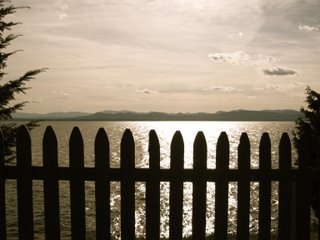


1 comment:
awful pretty honey...i think i get it finally...
Post a Comment